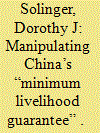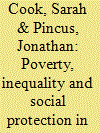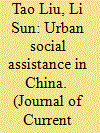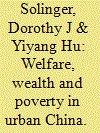|
|
|
Sort Order |
|
|
|
Items / Page
|
|
|
|
|
|
|
| Srl | Item |
| 1 |
ID:
164767


|
|
|
|
|
| Summary/Abstract |
This study provides one of the first empirical tests of the political impact of dibao, China's anti-poverty cash transfer programme. Using the China Family Panel Study 2010 data set and a propensity score matching method, the authors examine whether and the extent to which dibao benefits have impacted recipients' assessment of local government performance. To investigate the heterogeneity effect of dibao, the authors conducted separate analyses for urban and rural samples. Results have shown that receiving dibao benefits had a significant and positive impact on citizens' assessment of local government in China. Nonetheless, the subsample results suggest that the positive and significant impacts of dibao benefits might be driven mainly by the rural sample. Overall, the study implies that China's dibao policy has achieved a mixed success in alleviating discontent and boosting popular support for the government.
|
|
|
|
|
|
|
|
|
|
|
|
|
|
|
|
| 2 |
ID:
145129


|
|
|
|
|
| Summary/Abstract |
The Rural Minimum Living Standard is an important component of social security in rural areas of China, as it provides social assistance to poor rural households. The country’s size and large development heterogeneities, however, make the policy’s implementation a challenging task. Using quantitative and qualitative data from rural households and administrators in five provinces, we identify the pitfalls of multi-level implementation along with the difficulty of measuring income in rural, underdeveloped areas as key sources of an implementation gap that has led to a considerable degree of misallocation of monetary transfers. Changes in the budgeting process and the distribution method might improve the anti-poverty effect of social assistance without having to carry out additional monitoring.
|
|
|
|
|
|
|
|
|
|
|
|
|
|
|
|
| 3 |
ID:
187275


|
|
|
|
|
| Summary/Abstract |
This article compares receipt of dibao social assistance in rural and urban areas of China using household data from seven province-level units. The probability of dibao receipt is positively related to the number of persons in the household who are older, adults who do not work and to the possibility that the head of household is in poor health. Means testing based on household income is more stringent in urban areas while low household wealth is a more important factor of dibao receipt in rural areas. In rural China, membership of the Communist Party of China (CPC) increases the probability of dibao receipt. A larger proportion of ethnic minority households than majority households receive dibao.
|
|
|
|
|
|
|
|
|
|
|
|
|
|
|
|
| 4 |
ID:
167388


|
|
|
|
|
| Summary/Abstract |
Since the early 21st century, the Chinese government has proactively expanded social protection by providing better benefits and broader coverage for its people. However, a new puzzle has emerged in the Minimum Living Standard Scheme, ‘last resort of social protection’ in China. Normally, when the benefit standard is set higher, relatively more people situated below this line are entitled to receive assistance. However, in reality fewer people than expected receive support. We study the case of Guangzhou, the capital of Guangdong Province, to explain this phenomenon and analyse the social citizenship of marginalized groups in urban China. We reveal the decline in replacement rates and tighter conditionality applied to defining the ‘deserving poor’ by reviewing administrative data and policy documents from 1995 to 2016. Drawing on the longitudinal qualitative study conducted between 2009 and 2011, we further illustrate how the decreased replacement rate and tighter conditionality diminish the well-being of the poor. Our findings on policy changes and their outcomes in Guangzhou provide some important insights into poverty governance and social citizenship under China’s social development in the past decade.
|
|
|
|
|
|
|
|
|
|
|
|
|
|
|
|
| 5 |
ID:
117682


|
|
|
|
|
| Publication |
2012.
|
| Summary/Abstract |
This paper discusses the current social security and social assistance condition in Indonesia. Due to the complexity of introducing rules and regulations, social assistance has played a wider role than social security in Indonesia. Currently, there are six social assistance programmes, with Rice for the Poor (Raskin) being the longest running programme. In the case of social security, the National Health Insurance Programme (Jamkesmas) was introduced in 2008, and it is still being improved. With the introduction of Law No. 24 year 2011 regarding Executive Assembly for Social Protection (Badan Penyelenggara Jaminan Sosial, or BPJS), Indonesia is embarking on a comprehensive social protection programme which covers both health protection and pension, starting from 2014.
Finally, the social protection expenditures are compared with other expenditures in the central government's budget. In order to give more support to the social protection programme, the politics of government expenditures should shift from the utilitarian theory of justice to the Rawlsian theory of justice.
|
|
|
|
|
|
|
|
|
|
|
|
|
|
|
|
| 6 |
ID:
154156


|
|
|
|
|
| Summary/Abstract |
In 1999, the State Council set forth an urban social assistance program aimed chiefly at pacifying protesting laid-off workers and compensating for the breakdown of the work-unit-based welfare benefits that had obtained under the planned economy. While an initial goal was to ensure the political stability that would allow enterprise reform to proceed unchallenged, over time the content of the scheme shifted in line with new regime goals. First the program spread to the countryside, as the New Socialist Countryside model was installed. In the past few years, in line with a tightening of financial commitment, leaders have demanded that the able-bodied poor should work, not be succoured, and that the program’s allowances target the desperate. Also, beginning in 2014 and continuing into 2016 there has been heavy emphasis on fighting graft and corruption in the program. The paper details five alterations that have emerged – or policy slants for which earlier, less extreme changes in implementation have intensified – since Xi Jinping ascended to power. The big message here is that the regime has repeatedly reshaped this initiative to match the changing political agenda of the Party.
|
|
|
|
|
|
|
|
|
|
|
|
|
|
|
|
| 7 |
ID:
130049


|
|
|
|
|
| Publication |
2014.
|
| Summary/Abstract |
Social protection programmes have expanded rapidly in the developing world in recent years. In Southeast Asia, the experience of the Asian Financial Crisis of the 1990s heightened awareness of vulnerability to poverty and the role of government in protecting households from a sudden loss of employment and income, or from contingencies such as ill-health and ageing. Most governments have expanded targeted social assistance programmes, although the quality and coverage of these programmes vary from place to place. Public support for basic health and education services is also uneven. Common challenges in the region include economic risks associated with financial globalization, rapid urbanization, high levels of informal employment, rising dependency ratios and a highly unequal gender division of labour.
|
|
|
|
|
|
|
|
|
|
|
|
|
|
|
|
| 8 |
ID:
164765


|
|
|
|
|
| Summary/Abstract |
Using the China Household Income Project 2013 rural data set and a propensity score matching method, this study examines the association between participation in China's rural dibao programme and household consumption patterns. To provide a focused analysis of this relationship among low-income families, the authors restrict the sample to households whose per capita income was at or below 1.5 times the national poverty line. The results show that rural dibao recipient households shifted their consumption patterns by prioritising health and food over other expenses. It is regrettable that the rural dibao programme was unable to help increase educational investments in recipient families.
|
|
|
|
|
|
|
|
|
|
|
|
|
|
|
|
| 9 |
ID:
164761


|
|
|
| 10 |
ID:
147645


|
|
|
|
|
| Summary/Abstract |
In 1999 the State Council of the People’s Republic of China (PRC) introduced the Regulation on the Minimum Living Standard Scheme(MLSS, 低保 or dibao) for urban residents in China. Policy learning from different parts of the world significantly shaped the formation and expansion of the MLSS, and Chinese social policy researchers have drawn conclusions about the experiences of these multiple regions. Through expert interviews, we discovered that the Chinese social assistance scheme has been influenced by the US ideas of “social investment” and “workfare.” Furthermore, the European values of “universal entitlement” and “social citizenship” have also been internalised by the Chinese actors behind the scheme. In addition, Hong Kong’s social assistance scheme has inspired Chinese policymakers to explore a model consisting of various categories that target the country’s enormous special welfare needs. Thus, scholars and policymakers from China have used values and ideas outside China to create a hybrid model of social assistance that is characterised by broad coverage, a low benefit level, and a highly provincial administrative structure.
|
|
|
|
|
|
|
|
|
|
|
|
|
|
|
|
| 11 |
ID:
119185


|
|
|
|
|
| Publication |
2012.
|
| Summary/Abstract |
In the broader social science literature, most studies of social protection investigate welfare in democracies, and at the national level, and typically assume that welfare is given in order to influence voting. This paper, to the contrary, considers social assistance in authoritarian China at the urban level. Its findings are compatible with an explanation that there are two dissimilar logics influencing the distributional decisions of lower-level administrators. That is, there appear to be two modes of social policy implementation, which vary with the fiscal capacity of a given city, as indicated by its average wage: Wealthier cities seem to prefer to push off the streets those viewed as unsuited to a modern city, therefore allocating a substantial proportion of their social assistance funds to them, in order to entice them to stay at home. On the other hand, poorer places seem to permit such people to work outside, in the hope that they will thus be better able to support themselves, thereby saving the city money. A data set from China's Ministry of Civil Affairs was used.
|
|
|
|
|
|
|
|
|
|
|
|
|
|
|
|
|
|
|
|
|